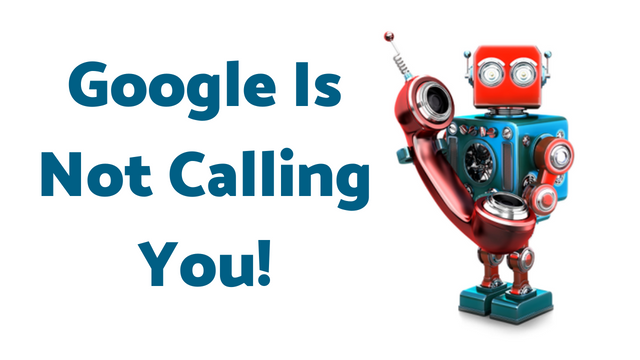“This is Google calling to verify your business listing”… No, unfortunately it is not, it is in fact a scam.
It’s easy to want to try and believe that Google is calling you. We would all love to believe that we have such a powerful business prowess that we get a call from the mighty Google who is floored by our unparallelled business savvy and absolute awesomeness. I hate to burst your bubble, but that’s not what is happening.
The problem is the same with all of these kinds of scams. People want it to be true no matter how unrealistic it is. Trust me, Google is not calling you any more than a Nigerian King is needing you to help him give away millions of dollars. Google has repeatedly said they are not, have not and will not “Robocall” you. A robocall is when you get an automated call from a company who wants you to press 1 or stay on the line. To make this abundantly clear… those kinds of calls are actually illegal. Google will never call you for any reason. Not to partner up with you, not to sell you ads or to sell you anything else for that matter.
Quote from the ‘Google Safety Center’
“Robocall scams are automated phone calls using recorded messages that may ask you to press a button to speak to a sales rep. Google doesn’t make these calls, so if it’s not a real person right from the start (and you didn’t request an automated call from us), it’s not Google.
Unfortunately, there are many unscrupulous individuals and companies who make these calls, even though they are breaking the law. Sometimes, robocalls falsely claim to be working “with Google” or “for Google” in an attempt to sell different schemes and online marketing services to unsuspecting individuals and companies.
These types of robocalls calls are illegal under U.S. law (unless you have given permission to receive them), and Google is never behind them.”
What makes these calls obvious as a scam is that they are pre-recorded call or a “Robocall”. This kind of calling tactic is actually illegal in the US thanks to the Telephone Protection Act.
So what’s the worst that can happen with this kind of scam? Some of these people are building lists of information to sell to identity thieves, then there is ransomware distributors, or they will use your info to try and extort you for money to regain control of your business’s online presence. None of which is ideal…
So please, if you get a call from Google, know that it’s not Google calling you but rather a con artist trying to do you harm.
The best way to detect if you are being scammed is to simply know the rules of the company. Google will never call you to help you set-up your Google Listings or sell you anything. Google has no interest in making you stand out from the crowd. That is literally the job of you and your digital marketing expert.
So the easy way to tell if you are being duped is simply knowing Google’s company policies. A Google associate will never:
- Charge a small business for inclusion in Google My Business or Google Search.
- Offer a fee-based service to improve your business’s search ranking or manage your online profile.
- Ask you for sensitive information over the phone about your Google account, including your Google password or verification code.
What Should You Do?
If you get a robocall don’t just ignore it. We need to shut this down. Having people like this in our realm is a terrible thing. It deceives good honest people and harms their business and also the community. These kinds of things are more sophisticated than the old “Nigerian King” wanting help allocating his millions off-shore. That’s an easy one to pinpoint from most people. However very sharp people are harming their businesses daily in an attempt to help grow their business. I mean it’s pretty invigorating to hear that Google is calling you directly because you are on their radar. I can assure you that you aren’t. You might be on the radar of a Google partner (Like Myself) but not Google itself.
Steps to take if you get an illegal robocall?
- Hang up the phone. Do NOT interact with the caller. Do NOT call back in order to be taken off the list – calling back can cause you to get more calls because the scammers know you are a possible opportunity.
- If you do end up in a conversation with a scammer, never reveal any personal information such as passwords, social security numbers, or account numbers. If you are not sure whether a caller is a scammer or not, remember that legitimate callers don’t call asking for personal information. Hang up immediately.
- Report the call to the FTC at DoNotCall.gov
- Information to include: time and date of call, the number that appeared on your Caller ID screen, your telephone number, and a description of the message.
- You normally won’t see immediate action, but the FTC’s complaint database is important – it helps government agencies and companies go after illegal robocallers and come up with new ways to attack the problem.
- Some call blocking applications will allow you to report calls to improve the accuracy of the service.


Recent Comments